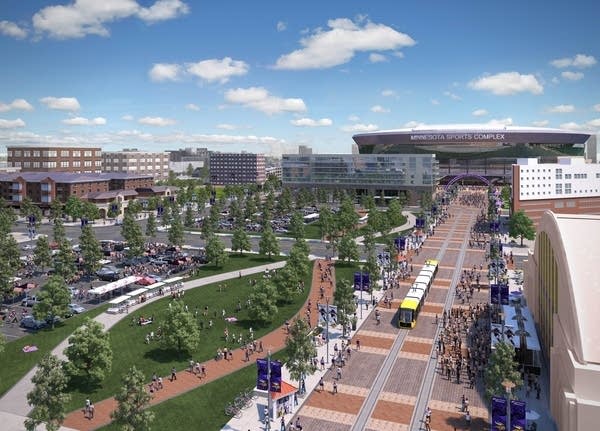Minneapolis City Council's stadium approval likely
Go Deeper.
Create an account or log in to save stories.
Like this?
Thanks for liking this story! We have added it to a list of your favorite stories.

The expectation is more certain that the Minneapolis City Council will approve the Vikings stadium plan put forth by lawmakers and Gov. Mark Dayton earlier this month.
Though critics have doubts about the $975 million project, key city council opponents concede they may be just running out the clock.
The council will take up the Vikings stadium as a committee on Thursday morning and is expected to take a final vote on the matter Friday. It's the last political hurdle the initial stadium deal faces.
Although Councilmember Betsy Hodges has previously voiced opposition to public subsidies for stadiums, the Ward 13 representative seems resigned to the prospect.
Turn Up Your Support
MPR News helps you turn down the noise and build shared understanding. Turn up your support for this public resource and keep trusted journalism accessible to all.
"We are going to disagree on Friday morning, but chances are good on Monday morning we're going to have to wake up and have to build a stadium in the city of Minneapolis," Hodges said. "This today, I think was a down payment on making sure that could happen well, arming ourselves with as much information as possible on the financing end of it."
Hodges spoke at the end of a nearly two-hour council committee hearing Monday. City officials combed through the financial nitty-gritty of the deal initially struck between the Dayton administration, the Vikings and mayor R.T. Rybak. The plan already won a narrow 7-6 approval in a test vote earlier this spring.
The deal depends on nearly $2.6 billion of expected sales and hospitality taxes to be collected in Minneapolis through the year 2046. About a quarter of that will go to pay for a $150 million city contribution toward construction, interest and yearly upkeep at the new stadium.

The remainder will go to various city projects, including paying off the city's convention center, paying the mortgage on the Target Center, as well as fixing up the NBA arena to bring in more event business.
But 9th Ward City Councilmember Gary Schiff still has doubts about the plan.
"Do we think that we have enough revenue left over to maintain our convention center, which fills far more hotel rooms and dinner tables in downtown Minneapolis than a Vikings facility will?" Schiff said.
The city's chief financial officer, Kevin Carpenter, said the plan would work. He said a new NFL stadium would pose no more of a financial burden than the Minneapolis Convention Center, which is due to be paid off in 2020. Carpenter said the sales and hospitality taxes could fund the rest of Minneapolis' wish list as well, even with modest growth.
"Two-percent growth in the tax revenue provides sufficient revenue to fully invest in the convention center, approximately $400 million over time, and Target Center, approximately $267 million over time," Carpenter said.
Ward 2 Councilmember Cam Gordon questioned why the city is trying at all to weigh the return on a Vikings investment. He said the alternative, letting the team pay for a new stadium, would pay handsomely, as well.
"I was wondering if we were to have a privately owned stadium, what would the property taxes be if they were a property tax-paying entity like many of the private businesses in this city," Gordon said. "The assessor informed me that they would be paying $41 million a year in property taxes, based on a stadium that was valued at $975 million."
Supporters say the Vikings will leave without financial help for their new stadium. The team is scheduled to pay $477 million of the stadium's up-front cost, just under half of the construction bill. The state is picking up $348 million of the share, paid for with taxes on new gambling.
City Council President Barbara Johnson said she is as sure as she can be that the council's 7-6, pro-stadium majority will hold later this week. She said the city can't afford to turn the deal down.
"We know that we don't want this to go back to the legislature," Johnson said. "We negotiated a really good deal, and it actually got better through the conference committee for the city of Minneapolis, and for us to send it back, you could open a whole new can of worms."





